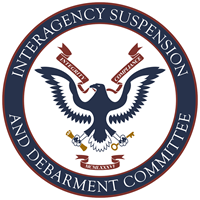By Andrew Victor, Annie Kim, and Steve Shaw
The Interagency Suspension and Debarment Committee (ISDC) provided its annual report to Congress for FY2018 on October 30, 2019. The report apprises Congress of improvements to the suspension and debarment process and provides a summary of federal agencies’ activities over the past year. The ISDC reported that federal agencies took 3,356 actions comprised of 480 suspensions, 1,542 proposed debarments, and 1,334 debarments. This marks an 8% year-over-year decline from FY2017. Last year’s actions, however, total nearly twice those of FY2009, when the ISDC first reported suspensions, proposed debarments, and debarments. The report also highlighted (1) the ISDC’s continuing push to harmonize procurement and non-procurement suspension and debarment procedures; (2) proactive engagements initiated by entities and individuals; and (3) the continuing use of “pre-notice letters” by agencies.
Procurement & Non-procurement Procedures. The ISDC explained that it was exploring the development of a consistent set of procedures for both procurement and non-procurement suspensions and debarments. This includes increasing the use of pre-notice tools covered in the Federal Acquisition Regulations (FAR) and expanding upon the FAR 9.406-1(a) debarment decision factors by adopting the mitigating and aggravating circumstances under 2 C.F.R. § 180.860. Presumably, if and when formal action occurs, the FAR Council will publish a proposed rule.
Proactive Engagement. The ISDC explained that its outreach efforts have encouraged individuals and entities to provide voluntary submissions to Suspension and Debarment Officials (SDOs) relating to their present responsibility on a proactive basis, such as when a contractor has self-identified possible misconduct or learned of a government investigation into allegations of misconduct. According to the ISDC, bringing matters to the attention of an agency proactively allows both sides to focus on corrective measures, improves internal controls and compliance programs, and promotes a culture of ethics. Voluntary submissions are not tracked by all agencies, but the ISDC reported that eight agencies reported 40 such instances in FY2018. Notwithstanding the ISDC’s remarks about encouraging voluntary submissions, FY2018 continued a decrease from FY2017 (53), itself a decrease from FY2016 (76). The reasons for this downward trend are not readily apparent, but worth noting. Are fewer agencies reporting voluntary submissions? Or are contractors discovering that bringing such matters to the attention of SDOs provides little benefit, as they are getting debarred anyway?
Pre-notice Letters. Pre-notice letters, such as show cause letters or requests for information, are tools for an agency to alert an entity or individual that its conduct is being reviewed and typically provide an opportunity to respond. The ISDC explained that using pre-notice letters enables agencies to assess risk without having to resort to suspension or debarment procedures. In FY 2018, agencies reported issuing 197 pre-notice letters, an amount just slightly over FY2017’s 193.
Overall. Notably, the FY2017-to-FY2018 number of declinations remained the same, 114, despite a 20% decrease in the number of referrals. This should be encouraging to contractors and implementers (i.e., grant recipients) and may be indicative of SDOs more carefully considering FAR 9.406-1(a) decision factors. The proportional increase in declinations should also tell contractors and implementers that the receipt of a pre-notice letter does not necessarily signify an inevitable debarment action. The report makes clear, however, that there is a wide discrepancy for declinations among the agencies. For example, while the EPA had 140 referrals and 41 declinations, the Navy had 398 referrals and 0 declinations and GSA had 392 referrals and 0 declinations. The wide discrepancy most likely indicates that agencies are not required to report declinations, although some do. We believe that the ISDC should require agencies to report declinations so that a more complete picture of activity is conveyed. If required to report them, declinations become another metric, along with exclusion actions, and may lead to a greater willingness for agencies to decline borderline or weak referrals.
Thus, despite a modest overall decline in activity, suspension and debarments remain among the government’s most potent tools. Contractors and implementers should carefully consider how to respond to pre-notice letters and explore how proactive engagements may help protect against suspension and debarment actions.
When faced with possible misconduct, Nichols Liu can help determine the benefits and risks of proactively approaching an agency. Likewise, we can help frame a response to a pre-notice letter or to serious questions raised by an agency or Office of Inspector General in order to achieve the best possible outcome. Should an agency be prepared to impose an exclusion, we have a strong record of defending against such actions.
